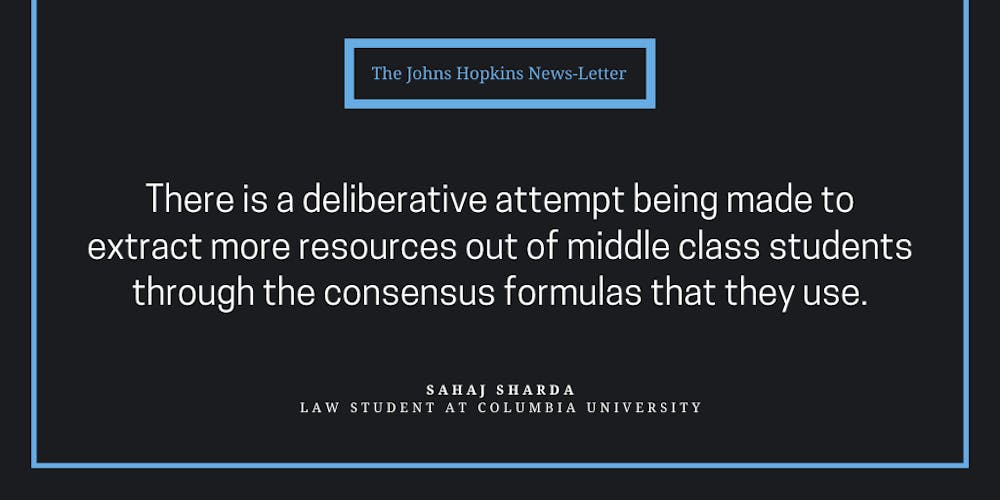A lawsuit filed in January of 2022 accused several top-ranking universities of colluding to limit the amount of financial aid awarded to students. Section 568 of the “Improving America’s Schools Act of 1994” detailed an antitrust exemption that permitted qualifying universities to agree on a common financial aid formula. Universities were limited by the requirement to practice need-blind admissions. This antitrust exemption expired on Sept. 30, allowing the case to proceed.
Hopkins joined the 568 Presidents Group in 2021, and an amended complaint was filed in February 2022 to include the University in the lawsuit.
In an email to The News-Letter, Robert D. Gilbert of Gilbert Litigators and Counselors, one of the plaintiffs’ lead counsel, asserted that the need-blind requirement of the exemption was not observed.
“Defendant universities never complied with the congressional mandate that they be need blind regarding all students and all families in admitting students,” he wrote. “Instead, for decades they exploited the exemption to favor wealthy applicants and families, and to disfavor applicants from middle-class and working-class families.”
Sophomore Tracy Nguyen similarly criticized the University for being a part of the 568 President group in an interview with The News-Letter.
“Hopkins is taking away opportunities from first-generation, low-income students, like myself, who depend heavily on financial aid to attend an out-of-state college with minimal support from parents,” she said. “With college being inaccessible for some of us, this is a step backwards.”
In an email to The News-Letter, Assistant Vice President for Media Relations and News J.B. Bird described that the University believes that they have acted within the law, emphasizing that the financial aid admissions practices have expanded to students from all socio-economic backgrounds.
“Johns Hopkins ranks among the top ten universities in per student financial aid support and has transformed the socioeconomic makeup of its undergraduate classes while raising academic standards,” he wrote. “We are proud of our commitment to need-blind admission and intend to vigorously defend this lawsuit.”
While the University was recognized as 9th in best value schools according to the 2022–2023 U.S. News & World Report, it was ranked 326 in universities for top performers on social mobility. Nationwide, elite institutions have been grappling with how to expand education access and increase financial aid.
In an interview with The News-Letter, Sahaj Sharda, a law student at Columbia University, outlined his research in understanding the market power of elite colleges and their impacts on financial aid.
Sharda started his research by trying to understand why college acceptances have been becoming more and more selective. He explained that while the number of college applicants has increased, the number of seats at elite colleges has not increased over the last forty years as they did in the forty years before that.
“If you maintained the same standards since 1990, you would have tripled or quadrupled enrollment at most of the elite colleges,” he said. “The actual academics at the schools are not getting harder, so I wanted to understand why schools are getting so much more selective.”
He claims that schools use popular ranking methods like U.S. News & World Report to create an artificial scarcity of seats at elite colleges. Sharda emphasized that the metrics of U.S. News prioritizes spending more per student, which in turn, pushes elite institutions to admit less students.
In explaining the work of the 568 Presidents Group, Sharda highlighted that allowing elite universities to collaborate on setting financial aid metrics prohibits middle-class families from being able to compare costs between universities.
“There is a deliberative attempt being made to extract more resources out of middle-class students through the consensus formulas that they use,” he said. “People are willing to pay more because they feel that they have to compete much more to get these limited number of seats.”
In an interview with The News-Letter, junior Kobi Khong also commented on how funding a college education is often the most difficult challenge that students face. He condemned how the University seemed to be prioritizing their own finances, instead of serving its purpose as an institute for education.
“When schools work together to make [paying for university] even more difficult, that's awful,” he said. “Providing higher education is now a business of how much money can they grab from students to fund their other projects, versus it originally being a way to educate people.”
Bruce Hamilton, professor emeritus of Economics, defined two branches of antitrust laws: one where competitors are supposed to compete and not collude and another where large corporations can exist as long as there is a justification for them in the form of scale economics.
Hamilton argued that universities are required to provide need-based financial aid as a stipulation of being a part of the 568 Presidents group, which is beneficial for students.
“Are [the Universities colluding] to make sure that the money each university sets aside for need based financial aid is actually targeted to people who need it? If so, it should not be a violation,” he said.
Gilbert, on the other hand, maintained that the group’s conversations on financial aid prices have not benefited students.
“By agreeing not to compete, they overcharged these applicants and families, and forced them to bear unnecessarily high debt,” he wrote. “Now defendants do not have any excuse for their collusion, which must end.”





